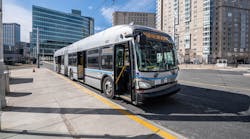MBTA to release Climate Assessment
The Massachusetts Bay Transportation Authority (MBTA) is releasing its climate assessment that takes stock of the MBTA’s climate mandate, achievements to date and identifies next steps for enhancing the transit system’s resilience and sustainability. Developed through a series of internal workshops, the climate assessment will be implemented by the new Climate Policy and Planning team led by the MBTA’s first Senior Director of Climate Policy and Planning Kat Eshel.
“Sound and reliable mass transportation is essential and the role we play at the MBTA to enhance and protect our environment is impactful. I’m proud of our efforts that further the goals of the Healey-Driscoll Administration. The creation of our first ever Climate Policy and Planning team with Senior Director Kat Eshel working as a team with all of our functional groups across the MBTA as we release the climate assessment is another meaningful step forward to advance our decarbonization and resiliency goals,” said MBTA General Manager and CEO Phillip Eng. “The MBTA is committed to delivering safe and reliable transit service that is not only a viable option, but the preferred choice of travel. With a commitment to the communities and public that we serve, we fully understand our responsibilities for resilient, sustainable and clean mass transportation in support of the environment and quality of life for generations to come.”
“I’m thrilled to be part of an agency where the core mission of providing public transportation is already a climate solution in and of itself,” Eshel said. “I am honored to join the ranks of existing staff working towards a decarbonized and resilient MBTA and our team looks forward to working across the agency and with regional partners to deliver a 2050-ready transit system for the communities we serve.”
MBTA says the climate assessment articulates a vision for climate resilience and sustainability for the agency, highlighting its impact as a climate solution twice over, both in operating a low-carbon transportation network and through its work to make its own operations increasingly sustainable and resilient. Initiatives to enhance resilience in turn support increased reliability and strengthen the attractiveness of the transit system; programs to reduce energy use and greenhouse gas emissions deepen the carbon-saving and environmental benefits of mass transit.
The climate assessment identifies key next steps to develop and implement decarbonization, resilience and power plans to ensure MBTA’s workforce is ready to deliver and operate a transit system that is adapted to the U.S.’s future climate.
MBTA notes the plans will build on the Healey-Driscoll Administration’s climate priorities laid out in the 180-day Climate Chief report, the Clean Energy and Climate Plan for 2025 and 2030, Beyond Mobility, and the MBTA’s own strategic plan. The Office of Climate Policy and Planning will help to ensure the MBTA’s ability to deliver high-quality safe, reliable and accessible transit service for generations to come in the face of unprecedented climate change causing sea level rise, extreme temperatures and weather events.
“From just climate policy to sustainable development planning and more, Kat has a wealth of experience and knowledge in the environmental field and we’re excited to have her employ her expertise at the MBTA,” said MBTA Chief of Policy and Strategic Planning Lynsey Heffernan. “We welcome Kat’s leadership of the Climate Policy and Planning team, as we continue to invest in the resilience of the MBTA system and make progress toward our climate goals.”
MBTA says the creation of the Office of Climate Policy and Planning advances the authority’s strategic plan and its goal to increase sustainability and enhance resilience of its transit system and builds on a body of past climate initiatives. The MBTA has undertaken several climate initiatives such as:
- Implementing the Bus Electrification Plan, including construction of charging infrastructure at the Quincy and North Cambridge bus facilities.
- Investing $22 million in energy efficiency projects over 10 years, yielding $17 million in annual energy savings.
- Carrying out climate vulnerability assessments for critical facilities, including rapid transit lines, critical facilities and tunnel networks, with additional assessments in planning.
- Closing critical present-day flood pathways at the Fenway and Aquarium stations.
- Incorporating climate resilience and sustainability scores in Capital Investment Plan (CIP) project evaluations.
MBTA notes sustainability initiatives have contributed to a 44 percent reduction in the authority’s greenhouse gas emissions since 2009 as a result of energy efficiency and fuel economy initiatives and renewable energy credit purchases. In the year since the Office of Climate Policy and Planning was announced in September 2023, the MBTA has continued to advance climate initiatives:
- Received approval from the MBTA Board to advance a $54 million plan to bring battery-electric train service to the Fairmount Commuter Rail Line by 2028, supported by $69 million of enabling infrastructure separately funded in the CIP.
- Advanced the systemwide tunnel flood mitigation program, receiving an additional allocation of $5 million in U.S. Department of Transportation (USDOT) PROTECT formula funding to further systemwide tunnel flood mitigation; issuing a $20 million procurement to design and construct a tunnel flood portal near the Airport station on the Blue Line; and participating in the city of Boston’s inaugural Deployables Day on Sept. 27.
- Secured a $35 million allocation through the USDOT Carbon Reduction Program to support investments in electric infrastructure investments and life and safety upgrades to support new battery-electric bus facilities, including the North Cambridge bus facility retrofit and the new Quincy bus facility, as well as electric vehicle charging at the Cabot and Charlestown bus maintenance facilities.
- Received an additional $40 million in July 2024 to purchase battery-electric buses through the U.S. Environmental Protection Agency’s Low-No Emissions grant program.
As part of the assessment’s release, the MBTA is partnering with the Metropolitan Area Planning Council to co-host an educational webinar for regional and municipal partners to raise awareness of climate initiatives at the MBTA and lay groundwork for deeper regional collaboration on shared sustainability and resilience priorities.





